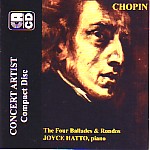[Editor’s Note: In the wake of the late-breaking scandal concerning the provenance of Joyce Hatto’s recordings, we had the option of removing all Hatto reviews, or leaving them intact and identifying the correct artists, to the extent possible, as we learn them. We have elected the latter, both as a caution and as a way to do some justice to the real artists as we learn their identities. So enjoy the review, but please refrain from purchasing this disc until we know who should get proper credit for it. DH]
Chopin’s Rondos seldom are recorded as a cycle and rarely figure in piano recitals. Some pianists claim that their negligible musical value is not worth the effort required to play them. To my way of thinking, it takes a special kind of artist to minimize the music’s frequently repetitious nature and maximize its charm. For instance, Frederic Chiu’s refined, slightly studied interpretations fall short of Vladimir Ashkenazy’s innate bravura and characterful variety, while Vladimir Horowitz’s galvanizing, utterly inspired account of the Op. 16 Introduction and Rondo has yet to be surpassed. Joyce Hatto’s interpretations fall somewhere between Chiu and Ashkenazy.
Hatto employs less tempo fluctuation than either Ashkenazy or Chiu, letting Chopin’s runs and roulades speak for themselves by virtue of her sparkling articulation and gorgeous tone. Yet the narrow compass of Hatto’s ordinarily wide dynamic range undercuts the potential for drama and surface glitter that might better “sell” these works. Perhaps the overly resonant sonics factor into my observation and fuel the half-hearted, over-pedaled, slightly labored impression I obtain from the C major Op. 73 Rondo (better known in its two-piano incarnation).
Happily, the engineering improves for the Ballades, where the piano gains in dynamism, detail, and presence. More importantly, Hatto is on top form. Her performances have everything: narrative sweep, immense musicality, organic textural diversity, and tempos that couldn’t feel more right if they tried. For example, the A-flat Ballade’s opening section actually is quicker than customary, yet Hatto’s ravishing legato phrases have lilting ebb and flow that prevents things from ever sounding rushed. The same can be said for the F major Ballade’s agitated sections, where you can hear every note. The G minor Ballade’s coda effortlessly emerges out of what came before, while the F minor Ballade boasts remarkable polyphonic clarity and rubatos borne out of harmonic logic rather than what’s convenient for the hands. Like Arrau and Moravec, Hatto manages to put an original stamp on these masterpieces without violating their letter and spirit, and as such, her Chopin Ballades deserve reference status.
































